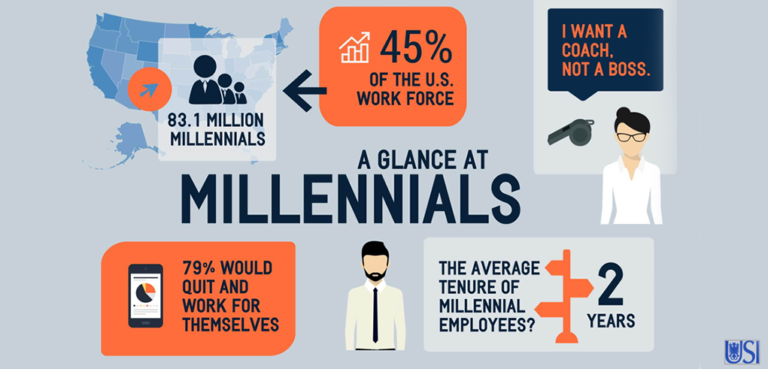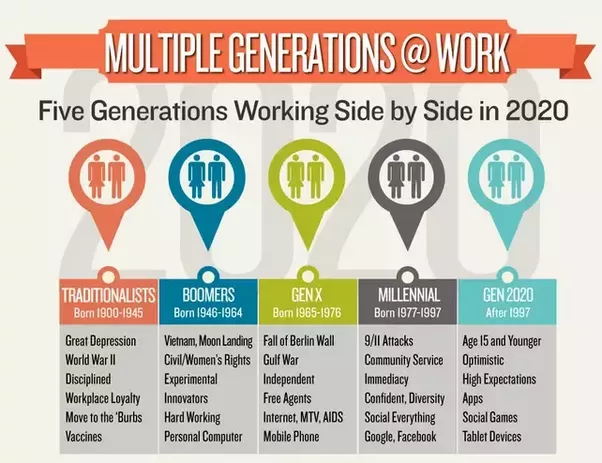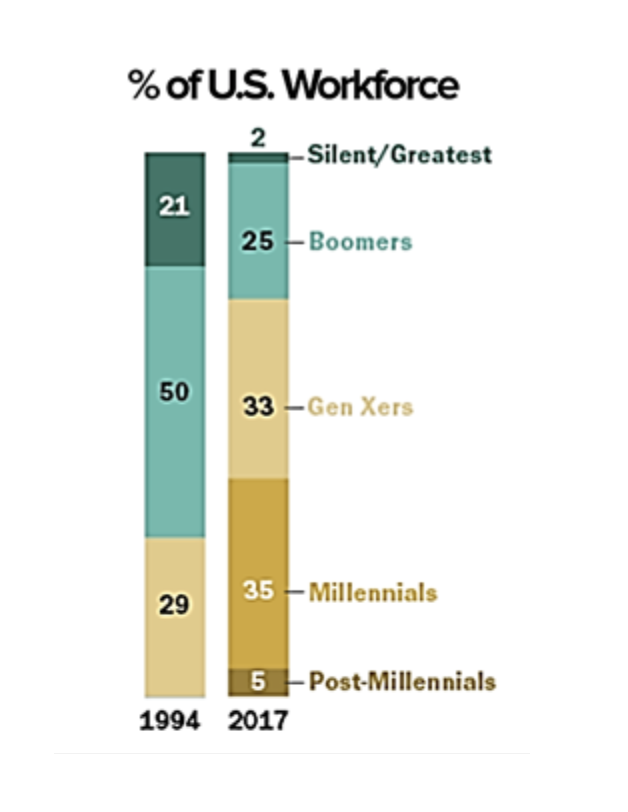Millennials are an ever popular topic in today’s workforce as they are finally on the brink of surpassing Baby Boomers as the nation’s largest living adult generation. While they haven’t quite passed Boomers in total population, millennials currently account for the most populous generation in the workforce at 53 million workers in the United States.
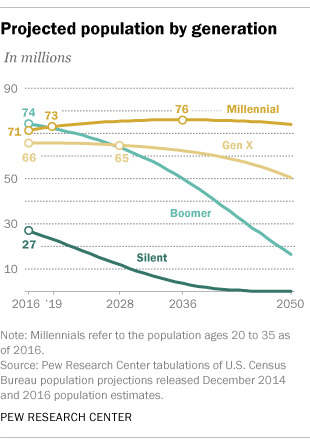
The most recent U.S. Census Bureau population projections, which were released on July 1, 2016, has Millennials totaling 71 million. While Baby Boomers currently sit atop that number at 74 million, by 2019 Millennials are expected to eclipse this generation in population as their numbers rise beyond 73 million while Boomers decline to under 72 million.
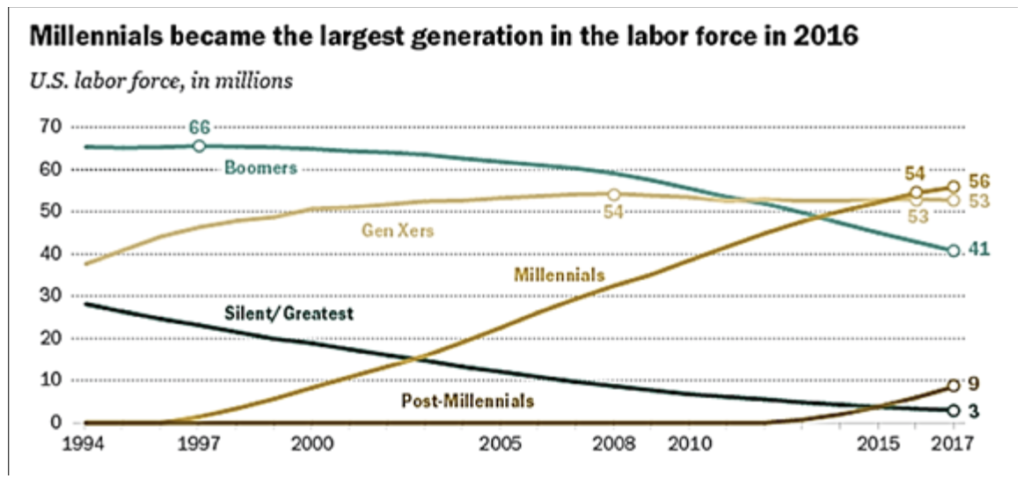
For success management of your workforce, it requires you to know what makes the millennial generation “tick”. Many companies have actually revamped their hiring strategies in an effort to attract better quality millennial talent.
Millennials have a significantly different working characteristics compared to GenX and Boomers – many of their tendencies were handed down from parents who pamper their children, a more structured way of living and an increase in diverse interactions. Where as with Millennials, they prefer to work in teams, desiring to make friends with their coworkers.
Because of their upbringing, they do particularly well with a diverse set of coworkers. The millennial generation has a can-do attitude that craves frequent feedback about their progress. In addition to the level of attention needed, they often seek numerous tasks to work on at one time while completely believing they will accomplish each and every one of them.
The point…? Millennials are by far the most connected generation in history, making them extremely unique in many ways compared to other generations and need to be managed as such in order to get the most out of them and help them reach their maximum potential.
The Generations Defined
Baby Boomers “Boomers”
Born: 1946 – 1964
Current Age: 54 – 72
U.S. Workforce Population: 25%
- Sense of self-worth often tied to career
- Viewed as workaholics
- Driven by material possessions and personal successes
- Optimistic outlook
- Prefer to communicate person-to-person
Generation X “GenX”
Born: 1965 – 1980
Current Age: 38 – 53
U.S. Workforce Population: 33%
- Product of change and unrest in their families and society
- Independent and self-directed
- Skepticism toward authority
- Adaptable and focused on results
- Motivated by a need for security
- Typically only asks for feed only when they feel it’s needed
Millennials “GenY”
Born: 1981 – 1996
Current Age: 22 – 37
U.S. Workforce Population: 35%
- First generation to grow up with internet and information technology
- High level of confidence due to involved, affirming parents
- Structured lives comfortable with multitasking
- Work to live, not live to work
- Work-life balance is more important than salary
- Desires learning and advancement opportunities
Post-Millennials “Nexters” / “GenZ”
Early stages of this generation
Born: After 1997
U.S. Workforce Population: 5%
- Digital natives with shorter attention spans
- Creative especially as it relates to technology
- Open-minded and expects feedback
- Motivated by a flexible lifestyle, not money
- Strong commitment to social responsibility but prefers face to face communication
- Enjoys working on small, structured teams

6 Strategies to Maximize Millennial Productivity
1. Implement Structure
Millennials were brought up with more structure in their lives than generations before them. Keep this in mind when establishing your sales culture and have a firm framework that outlines each millennial employee’s daily and weekly tasks. Their days need to have routinely consistent hours, reports need to have a set in stone due date, and meetings should have an agenda with minutes, and so forth.
One of the most important aspects of managing millennials is to clearly articulate their sales goals and provide progress reports. This generation likes their feedback. They want to know what they’re doing well and get their gold star on the board for good work. Millennial salespeople shouldn’t be trapped in a box necessarily, but they should have something preventing them from roaming anywhere they please.
Need help establishing sales goals? Download our free Sales Goals Template:
2. Quality Leadership
The millennial mindset needs a role model, they need someone they look up to and can aspire to be. Part of being able to offer feedback they can learn from is having the right leaders in place that can not only recognize where they’re doing well or falling short, but also possess the communication skills to relate that information in a constructive, positive manner.
This group wants to be included on the inside – they want to be kept in the loop and told all of the information. This requires your sales managers to dedicate time specifically to coaching and development. Managing millennials demands this level of commitment from your leadership team. They want your company and their direct manager to invest in their success.
3. Promote Positivity
Remember that “can-do” attitude we mentioned earlier? Well… here it is again. Millennials don’t like to focus on just one task at a time because they’re told by their parents all their lives how great they are at everything. Use this to your advantage.
Empower them through encouragement. Avoid making them feel like they’re tied down or limited in any way. Their personal self-image is extremely important because it boosts their sense of self-worth. They want to provide their own input and offer suggestions. Lift millennial salespeople up to share their ideas and have their voice heard. Positivity maximizes their can-do attitude and drives them to accomplish more.
4. Stress Teamwork
More than any other generation before, millennials love to work in teams. They don’t like to be alone because they like to feel like they’re contributing to something greater. Millennials believe they’re able to accomplish more when they’re with their peers compared to pitching in on their own.
When millennials work in groups, their level of work is likely to rise. Try allowing salespeople to tag-team certain tasks or prospects when appropriate. The energy level among the team will be on the incline. As a manager of millennials, try taking a team approach when mentoring, coaching and training. Because they want to know the people they work with, you’re likely to see a more cohesive sales culture. Use this to your advantage.
5. Hear – Don’t Just Listen
There’s a massive difference between listening to someone and truly hearing the words that they’re speaking. Going back once again to the millennial upbringing, their parents structured their schedule and day around the activities of their children. With how much they’ve been catered to, millennials can’t stand when their thoughts and ideas are ignored.
The trick to managing millennials is to not just listen to what they have to say, but to actually hear what they’re saying. At the very least, give what they’re saying some consideration and respond with suggestions on why their opinion could work for your sales team or not. When they feel heard, they feel like they’re contributing more and a part of something special. If their parents did it, they expect you to do it.
6. Emphasize Culture
The millennial generation is driven by their can-do attitude and positive mindset. With their work ethic and desire to be a part of something unique, managers need to stress the importance of a fun and energetic working environment. Millennials want to enjoy what they do and where they work.
Managing millennials, especially in a high stress, high pressure industry like sales, demands that you encourage an employee-centric workplace. To create the right culture for this generation, invest in team building activities that cater to what millennials like to do. Your work environment should promote communication between salespeople and bring them together in ways they may not have otherwise had the opportunity to do so.
3 Costly Mistakes Leaders Make When Managing Millennials
1. Failing to Comprehend Millennial Motivations
Without understanding what motivates the largest generational workforce in the U.S. today, it’s going to be extremely difficult to properly incentivize them. The millennial generation values being appreciated and are driven by experiences as opposed to material possessions. They’d rather have a healthy and enjoyable work environment rather than being financially compensated.
A Gallup poll found that “engaged” millennials were almost 65% less likely to jump around between jobs than “unengaged” millennial workers. Additionally, 84% of millennials are more concerned with making a considerable difference in the world than they are about being professionally recognized. Failing to understand what motivates this generation is a critical mistake managers make all too often when managing millennials.
2. Not Investing in Employee Training & Development
Just under 87% of millennials in the workforce stated that professional development and advancement was a key aspect considered when evaluating the desirability of a new job. Despite the copious amounts of data proving that millennials value learning, far too many companies in the door to door and outside sales industries neglect training and development.
While training undeniably comes with a price tag attached to it, the positives significantly outweigh the negatives. Salespeople that are properly onboarded and provided ongoing training are considerably more likely to achieve their sales targets. As a result of success in the workplace, your turnover rates will decrease. Due to the excessively high cost associated with hiring a new salesperson, this alone justifies the investment in your salespeople.
3. Assuming Millennials and Nexters are the Same
It’s easy to assume that all young people are alike, especially as it relates to managing millennials and Nexters, or Generation Z. While there are many similarities due to the technological society both were raised in, the two generations have some key differences that should be understood in order to effectively lead these young professionals.
Like millennials, Nexters are motivated by a flexible lifestyle as opposed to financial incentives, but prefer to work in smaller groups with more structure. Where millennials want and encourage feedback, GenZ expects it. Additionally, they tend to favor face to face and in-person communication more so than millennials.
Managing millennials requires much more collaboration compared to the younger Nexters. GenZ is more entrepreneurial and highly individualistic in relation to their counterparts. Because of their entrepreneurial mindset, they generally like to work alone more often than millennials. Effective management will require different techniques to achieve success with each generation, something that is currently overlooked in a large way by sales organizations.
Conclusion
With millennials currently occupying the largest percentage of the U.S. workforce, it’s essential to play into their hand by giving them a voice and empowering them with the ability to do more. They’re a generation of can-do spirit and multitasking capabilities that should be utilized.
______
Questions or comments? Contact SPOTIO at [email protected] or comment below.
SPOTIO is the #1 field sales automation and performance management software that will increase revenue, maximize profitability, and boost sales productivity.
Want to see a product demonstration? Click here to see how SPOTIO can take your sales game to the next level.

